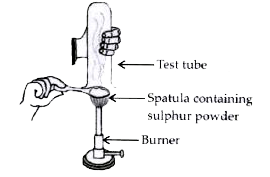Complete Solutions to NCERT SECTION of chapter METALS AND NON METALS of Class 10 book with complete answers and questions
| Class 10 | CHEMISTRY |
| Chapter | METALS AND NON METALS |
| MTG IIT JEE FOUNDATION | NCERT SECTION |
| Number Of Questions | 31 |
| Academic Year | 2023-24 |
Give an example of a metal which
(i) is a liquid at room temperature.
(ii) can be easily cut with a knife.
(iii) is the best conductor of heat.
(iv) is a poor conductor of heat
View SolutionExplain the meanings of malleable and ductile.
View SolutionWhy is sodium kept immersed in kerosene oil?
View SolutionWrite equations for the reactions of
(i) iron with steam
(ii) calcium and potassium with water
View SolutionSamples of four metals A, B, C and D were taken and were added to the following solutions one by one.
The results obtained have been tabulated as follows :
`{:("Metal",,"Solution to which metal is added",,),(,"Iron(II) sulphate","Copper(II) sulphate","Zince sulphate","Silver nitrate"),("A","No reaction","Displacement"," __"," __"),("B","Displacement"," __","No reaction"," __"),("C","No reaction","No reaction","No reaction","Displacement"),("D","No reaction","No reaction","No reaction","No reaction"):}`
Use the table given above to answer the following questions :
(a) Which is the most reactive metal ?
(b) What would you observe when B is added to solution of copper(II) sulphate ?
(c ) Arrange the metals A, B, C and D in order of increasing reactivity.
View SolutionWhich gas is produced when a reactive metal reacts with dilute hydrochloric acid ? Wirte the chemical reaction when iron reacts with dilute `H_(2)SO_(4)`.
View SolutionWhat would you observe when zinc is added to a solution of iron (II) sulphate?
Write the chemical reaction that takes place.
View Solution(i) Write the electron-dot structures for sodium, oxygen and magnesium.
(ii) Show the formation of `Na_(2)O` and `M_(g)O` by the transfer of electrons.
(iii) What are the ions present in these compounds?
View SolutionWhy do ionic compounds have high melting points?
View SolutionDefine the following terms.
(i) Mineral
(ii) Ore
(iii) Gangue
View SolutionName two metals which are found in nature in the free state.
View SolutionWhat chemical process is used for obtaining a metal from its oxide?
View SolutionMetallic oxides of zinc, magnesium and copper were heated with the following metals.

In which cases will you find displacement reactions taking place?
View SolutionWhich metals do not corrode easily?
View SolutionWhat are alloys?
View SolutionWhich of the following pairs will give displacement reactions?
View SolutionWhich of the following methods is suitable for preventing an iron frying pan from rusting?
View SolutionAn element reacts with oxygen to give a compound with a high melting point. This compound is also soluble in water. The element is likely to be:
View SolutionFood cans are coated with tin and not with zinc because
View SolutionYou are given a hammer, a battery, a bulb, wires and a switch.
(a) How could you use them to distinguish between samples of metals and non-metals?
(b) Assess the usefulness of these tests in distinguishing between metals and non – metals.
View SolutionWhat are amphoteric oxides? Give two examples of amphoteric oxides.
View SolutionName two metals which will displace hydrogen from dilute acids, and two metals which will not.
View SolutionIn the electrolytic refining of a metal M, what would you take as the anode, the cathode and the electrolyte?
View SolutionPratyush took sulphur powder on a spatula and heated it. He collected the gas evolved by inverting a test tube over it, as shown in figure below

(a) What will be the action of gas on
(i) dry litmus paper ?
(ii) moist litmus paper ?
(b) Write a balanced chemical equation for the reaction taking place.
View SolutionState two ways to prevent the rusting of iron.
View SolutionWhat type of oxides are formed when non-metals combine with oxygen?
View SolutionGive reasons
(a) Platinum, gold and silver are used to make jewellery.
(b) Sodium, potassium and lithium are stored under oil.
(c) Aluminium is a highly reactive metal, yet it is used to make utensils for cooking.
(d) Carbonate and sulphide ores are usually converted into oxides during the process of extraction.
View SolutionYou must have seen tarnished copper vessels being cleaned with lemon or tamarind juice. Explain why these sour substances are effective in cleaning the vessels.
View SolutionDifferentiate between metal and non-metal on the basis of their chemical properties.
View SolutionA man went door to door posing as a goldsmith. He promised to bring back the glitter of old and dull gold ornaments. An unsuspecting lady gave a set of gold bangles to him which he dipped in a particular solution. The bangles sparkled like new but their weight was reduced drastically. The lady was upset but after a futile argument the man beat a hasty retreat. Can you play the detective to find out the nature of the solution he had used?
View SolutionGive reasons why copper is used to make hot water tanks and not steel (an alloy of iron).
View Solution
NCERT SECTION questions and complete solutions for chapter METALS AND NON METALS of MTG IIT JEE FOUNDATION of Class 10
All Exercises from MTG IIT JEE FOUNDATION Class 10 CHEMISTRY METALS AND NON METALS
- Exercise (Comphrehension Type )
- Exercise (Subjective Problems) Long Answer Type
- Exercise (Subjective Problems) Short Answer Type
- Exercise (Subjective Problems) Very Short Answer Type
- Exercise (Assertion & Reason Type )
- Exercise (Integer/Numerical Value Type )
- Exercise (Match the following )
- Exercise (Multiple Choice Questions ) Level-1
- Exercise (Multiple Choice Questions ) Level-2
- ILLUSTRATIONS
- NCERT SECTION
- Olympiad/HOTS Corner
- Solved Examples